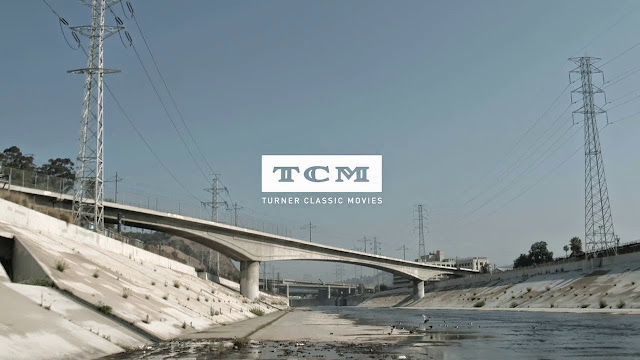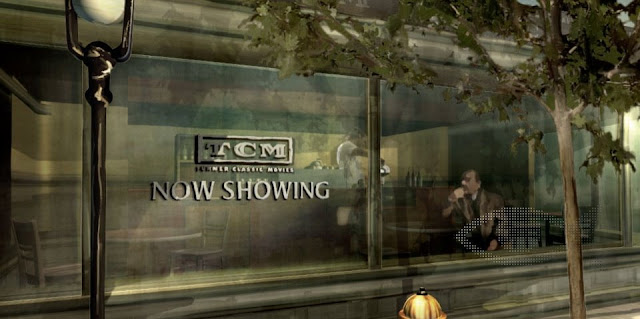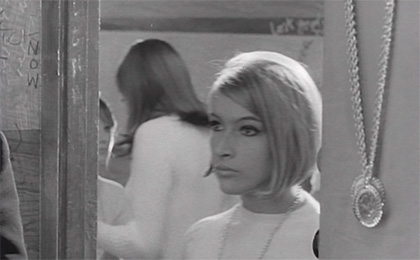 |
| (Photo source: The Branding Source) |
During Asian Pacific American Heritage Month, Hispanic Heritage Month and Black History Month, TCM devotes hours of programming to works featuring actors of color (or made by filmmakers of color) and gets film historians of color to sit with Osborne and provide their input on those films. It's aired cult favorites and obscure gems like The Crimson Kimono and Killer of Sheep that I was dying to see and weren't available on DVD when they aired (before a manufactured-on-demand service like Warner Archive came along to rescue many of those titles from unavailability) or were difficult to get access to on Netflix because they'd get stamped with that dreaded "Very long wait" status. The channel frequently exposes you to marathons of works by filmmakers you wish you were more familiar with. TCM is like film school without the outrageous tuition fees.
Ted Turner's movie channel isn't the first basic cable channel to broadcast movies uncut, commercial-free and in their original aspect ratios, but as competitors like TCM's precursor AMC, IFC and FXM succumbed to censoring their movies and inserting commercials to stay afloat, TCM has stubbornly stuck to its principles of never laying a finger on its movies (if a movie from the '70s, '80s or '90s is full of profanities, TCM airs it only late at night). Instead of ads, TCM makes a profit through experiential marketing, or as the Times explains that lofty term, "a guided tour of New York movie sites and sights on a sightseeing bus, to be offered by TCM and On Location Tours three days a week, beginning on Thursday; an annual Hollywood film festival in April; a yearly TCM Classic Cruise in December; an auction of movie memorabilia, planned for November, in partnership with Bonhams; screenings of movies like Frankenstein and To Kill a Mockingbird in theaters around the country; and DVD collections sold online and by retailers." As Osborne told the Times, all those things are "anything we can do to keep the company making enough of a profit so we don’t have to have commercials, sell underarm deodorants and all that."
Isn't Osborne just the coolest host? He's the anti-Rex Reed, as in he knows what he's talking about and he isn't a racist douchebag. And when he interviews older movie stars or filmmakers, he's the anti-James Lipton, as in he's respectful to them without coming off as creepy and he doesn't do that stupid "I'd like you to respond as your character from blankety-blank" thing. It's amazing that Osborne's still the face of TCM, even though he's started cutting back on his on-air time due to his age and recent health problems. The day when he either completely retires or dies is going to be a very sad one for TCM. I'm grateful to TCM for the following 20 moments in the channel's history (16 of them are movies I first saw on TCM and the rest of them are either special programming events or activities outside the channel schedule).
The Crimson Kimono
Asian America loves it when a young Asian American actor gets to defy Hollywood's tendency to emasculate Asian guys and play the romantic lead on TV for once, whether it's John Cho hooking up with Gabrielle Union on FlashForward or currently, Steven Yeun romancing Lauren Cohan on The Walking Dead. But decades before Cho or Yeun, James Shigeta actually got the girl in Samuel Fuller's amazing 1959 noir The Crimson Kimono. As Philip W. Chung wrote in YOMYOMF, "Now Fuller wasn't perfect. His House of Bamboo (1955) was a typical white man in Asia action thriller, and in China Gate (1957), he couldn't resist putting Angie Dickinson in yellow face, but overall, his films were pretty progressive." And The Crimson Kimono is a great example of Fuller's progressiveness, as Shigeta's Nisei homicide detective Joe Kojaku falls for art expert Christine Downs (Victoria Shaw) while he and his partner (James Corbett) investigate a stripper's murder in Little Tokyo, a part of L.A. that receives a remarkably non-stereotypical treatment from Fuller's film. As Ryan Reft said in his piece on The Crimson Kimono for KCET, "Fuller attempts to distinguish Little Tokyo, but not in any exoticized way; these are just normal Americans going about their business." The Crimson Kimono is one of several Fuller films I was introduced to by TCM, and it's made me want to see more of his works.
Killer of Sheep
A black-and-white 1977 gem that UCLA grad student Charles Burnett made about the working class in Watts, Killer of Sheep wasn't released theatrically until 2007 and is a landmark achievement in both African American cinema and indie cinema I was first exposed to through a TCM marathon of Burnett works hosted by Burnett and Osborne. Too many contemporary American films that are centered on communities of color are heavy on the speechifying or pandering and do more telling than showing. Killer of Sheep simply shows. At one point, Burnett's camera captures a little girl (dog mask-wearing Angela Burnett, the director's daughter) playing with her doll and clapping and mumble-singing along to Earth, Wind & Fire's "Reasons." The kid's off-key sing-along and a wordless slow dance between her parents to Dinah Washington's "This Bitter Earth" are examples of how Killer of Sheep establishes the film's setting and mood more effectively than any piece of lengthy dialogue or voiceover ever could. Another moment along those lines is the visual of kids leaping from rooftop to rooftop--hey, they're the first parkourers--and it's such a striking shot that it's no wonder Mos Def turned it into the cover of his 2009 album The Ecstatic.
Three Days of the Condor
I first caught Three Days of the Condor back-to-back with Marathon Man as part of a TCM night of '70s political thrillers, one of the channel's countless, cleverly programmed theme nights. Long before Robert Redford gave one of the best performances in a Marvel Studios blockbuster in Captain America: The Winter Soldier, he was attempting to outwit assassins hired by his own CIA employers to snuff him out in this enjoyable 1975 conspiracy thriller that heavily influenced the Russo brothers when they directed The Winter Soldier. While Chris Evans is joined in his crusade against HYDRA by a nicely diverse cast of allies (Scarlett Johansson, Anthony Mackie, Samuel L. Jackson and Cobie Smulders), Redford, the lone survivor of a CIA office massacre, has only his wits to keep him alive. The silliest part of Three Days of the Condor is that Redford's supposed to be playing a book nerd, and when you think "book nerd," you don't picture Redford. You picture sickly Steve Rogers before the super-soldier serum transformed him into Captain America. But it's a testament to Redford's skills as an actor that he makes you buy his character's nerdiness and inexperience in the field despite his movie-star looks.
Godzilla (1954)
If your idea of Godzilla is that it's a cheesy and campy franchise, prepare to be surprised by how dark and suffused with post-Hiroshima/Nagasaki paranoia the first and most serious of the Toho Godzilla films really is. Monsters director Gareth Edwards' upcoming Godzilla remake is reportedly modeled after the 1954 Godzilla, so if you're turnt up by the recent Godzilla trailer footage, check out the 1954 film to get a taste of what Edwards intends to accomplish with his gritty remake. The version of the 1954 film I saw on TCM was the original Japanese version, so if you wind up with the version where Perry Mason is frequently seen interrupting Zilla's rampage, get the hell rid of it.
Dersu Uzala
My journalism teacher Conn Hallinan once recommended Dersu Uzala to me in class while we were discussing a capsule I wrote in the campus paper about the video release of one of my favorite films, Akira Kurosawa's Seven Samurai. So when the 1975 Kurosawa film turned up on TCM 17 years after he first mentioned it to me, I finally saw it and was particularly impressed by the nail-biting sequence where Russian explorer Arseniev (Yuri Solomin) and his Siberian guide (Maksim Munzuk), the titular woodsman, battle both the harsh winter winds and their own physical exhaustion to build a straw hut in order to save themselves. It's one of my favorite sequences in a Kurosawa film.
 |
| (Photo source: DVD Beaver) |
Like Kurosawa, Vittorio De Sica, the director of Bicycle Thieves, is another foreign filmmaker whose works I got to see on TCM. I don't think I've ever seen a film like De Sica's Yesterday, Today and Tomorrow, a 1963 triptych of stories each set in a different part of Italy, with Sophia Loren and Marcello Mastroianni starring as a different couple in each one. Loren's striptease towards the end of the film still sizzles despite its chasteness.
Juggernaut
Why do the only good disaster movies--Juggernaut and A Night to Remember--both come from the U.K.?
Lord Love a Duck
Roddy McDowall is the least convincing high-schooler ever. When McDowall did Lord Love a Duck, he was 90210 years old.











